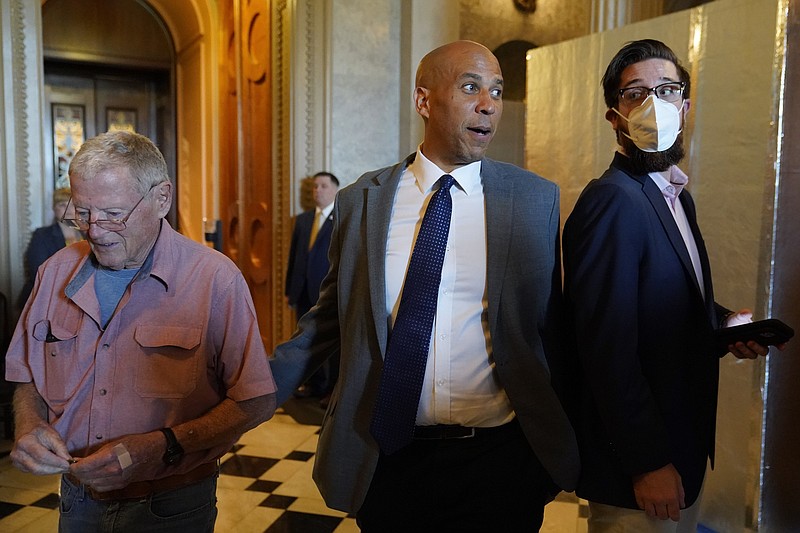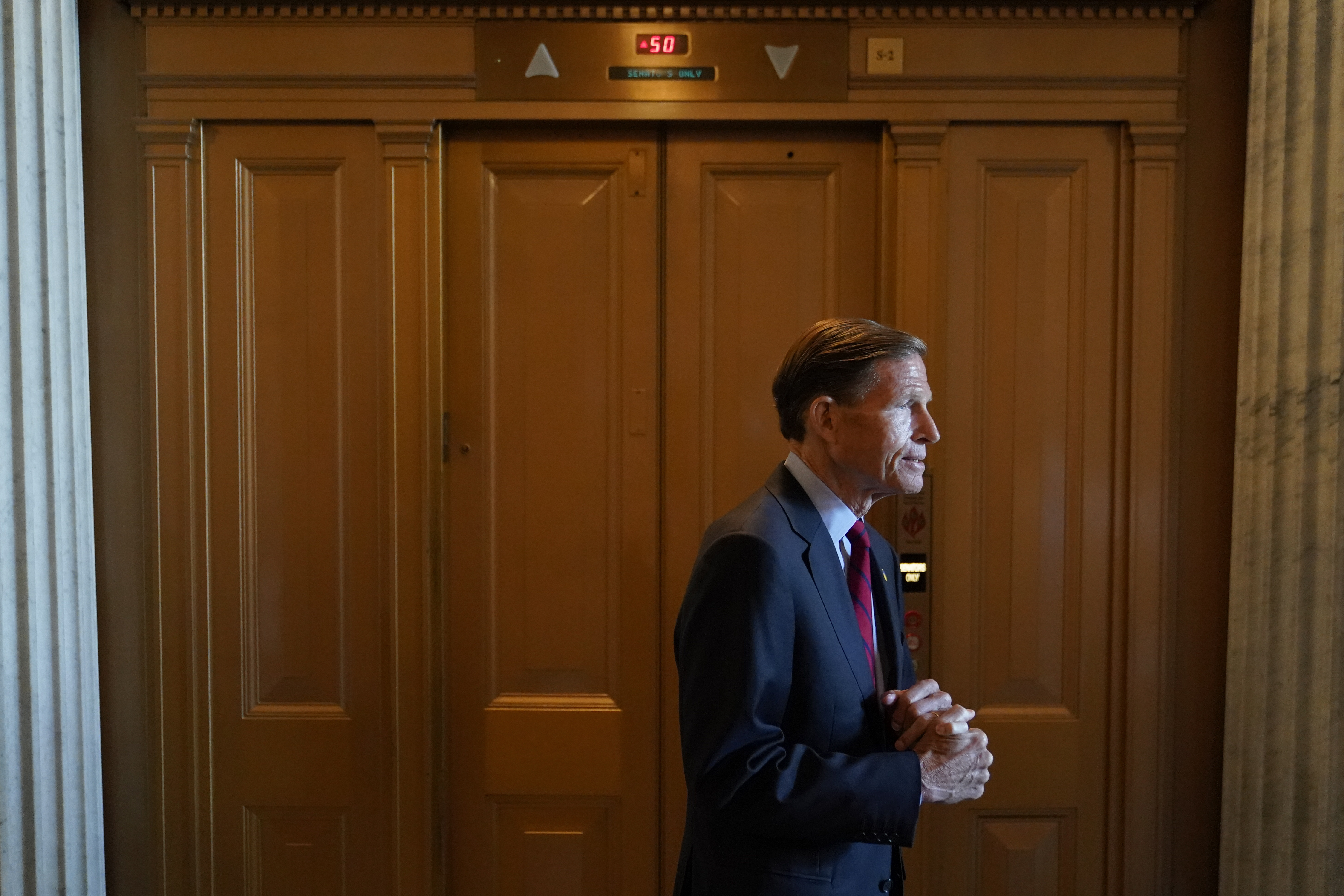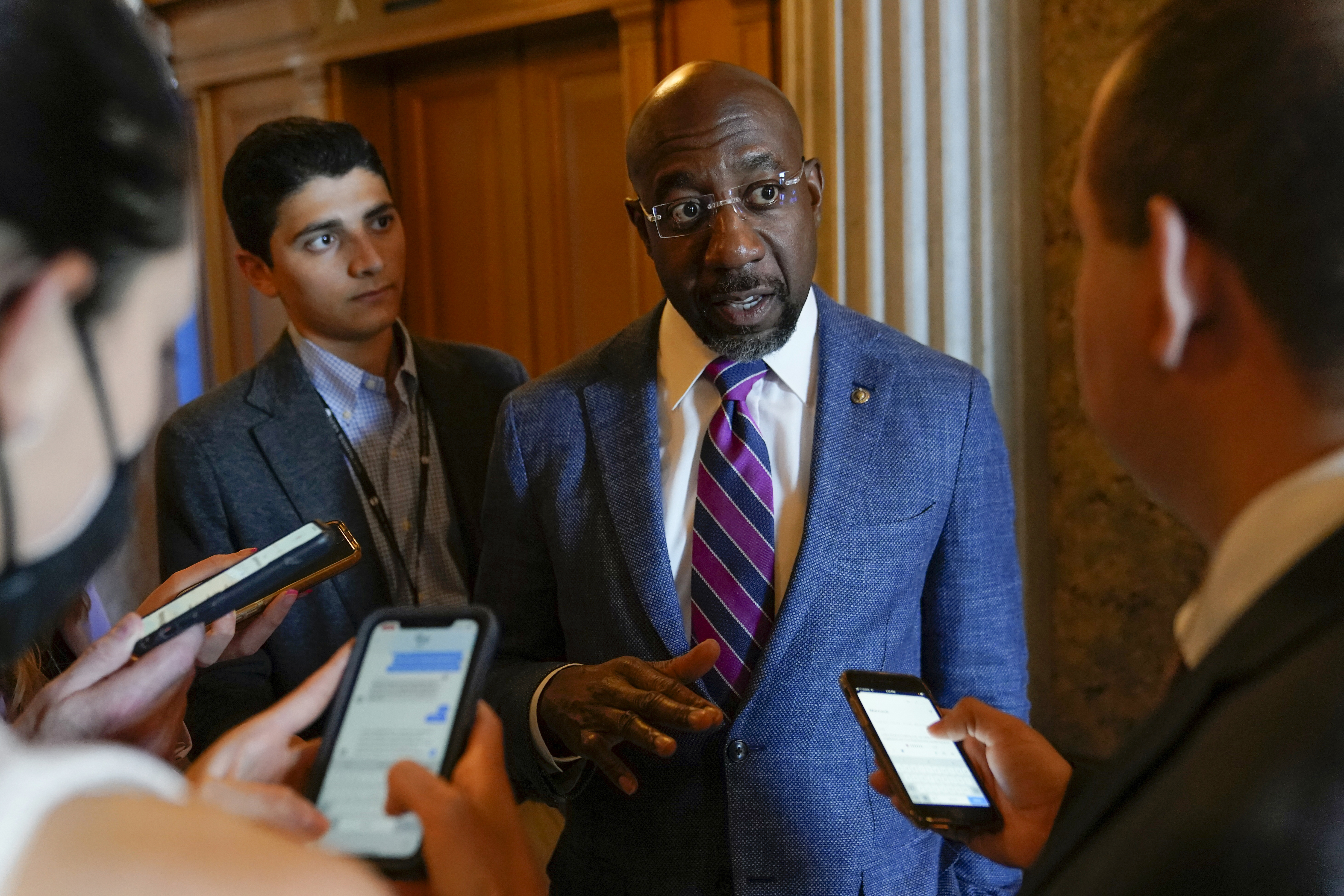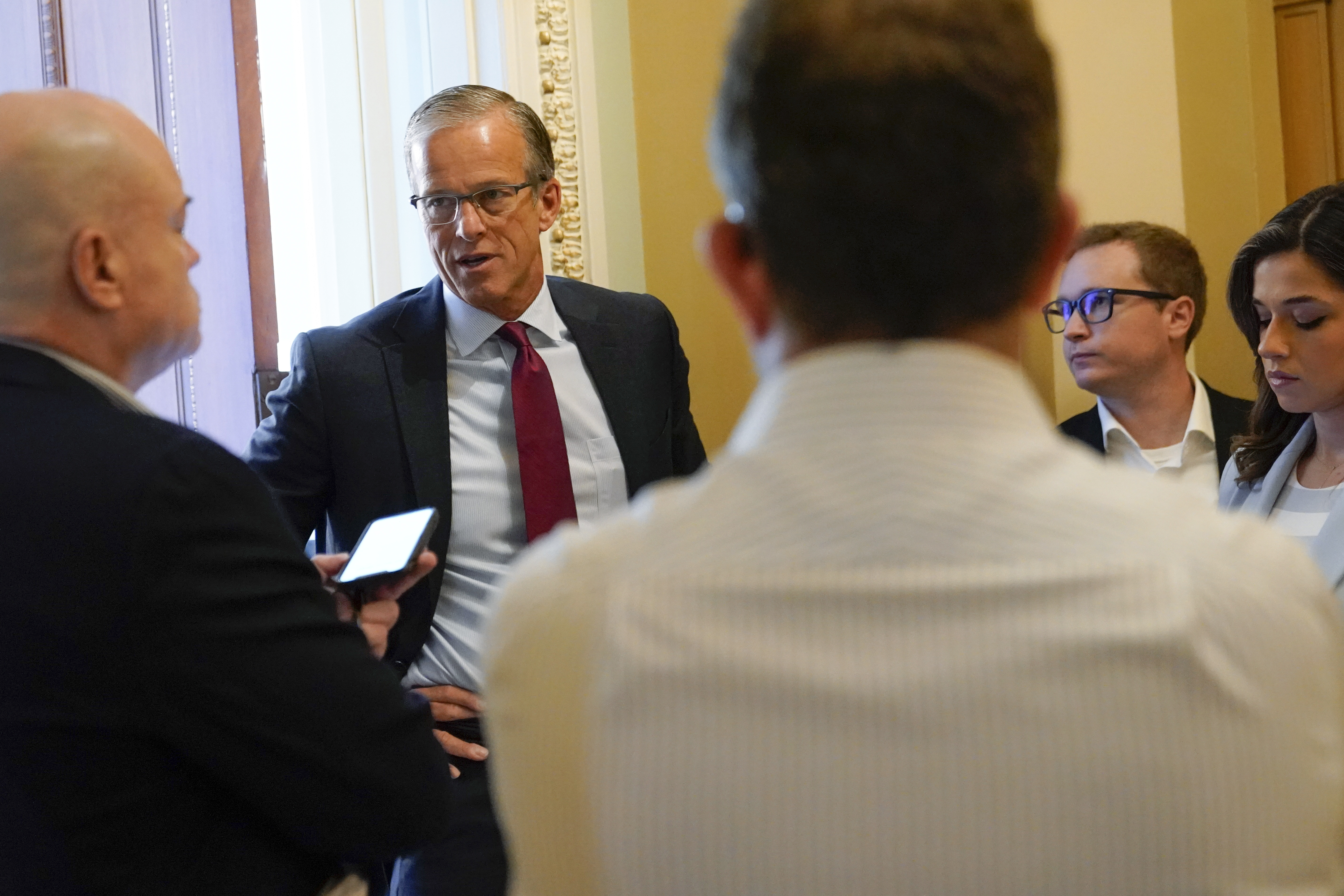WASHINGTON -- A divided Senate voted Saturday to start debating Democrats' election-year economic bill, boosting the sprawling collection of President Joe Biden's priorities on climate, energy, health and taxes past its initial test as it starts moving through Congress.
In a preview of votes expected on a mountain of amendments, united Democrats pushed the legislation through the evenly divided chamber by 51-50, with Vice President Kamala Harris breaking the tie and overcoming unanimous Republican opposition. The package, a dwindled version of earlier multitrillion-dollar measures that Democrats failed to advance, has become a partisan battleground over inflation, gasoline prices and other issues that polls show are driving voters.
The House, where Democrats have a slender majority, could give it final approval Friday when lawmakers plan to return to Washington.
The vote came after the Senate parliamentarian gave a thumbs-up to most of Democrats' revised 755-page bill. But Elizabeth MacDonough, the chamber's nonpartisan rules arbiter, said Democrats had to drop a significant part of their plan for curbing drug prices.
MacDonough said Democrats violated Senate budget rules with language imposing hefty penalties on drugmakers who boost their prices beyond inflation in the private insurance market. Those were the bill's chief pricing protections for the roughly 180 million people whose health coverage comes from private insurance, either through work or bought on their own.
"I am disappointed that the calculation for the Medicare inflation rebate that included commercial units sold was ruled out of compliance, but the legislation nevertheless puts a substantial check on Big Pharma's ability to price-gouge," Senate Finance Committee Chairman Ron Wyden, D-Ore., said in a statement.
The bill was estimated to save the government $288 billion over 10 years, providing a funding stream for the subsidy spending. Losing the inflation caps entirely would cost Democrats at least $36 billion, according to the Congressional Budget Office's previous estimate of the provision.
A separate provision capping out-of-pocket costs for insulin at $35 per month for those with private insurance also was blocked, according to a person familiar with the matter.
Democrats still could change the bill. They are expected to essentially dare Republicans to strip a proposal to cap the cost of insulin for all patients, a measure that would not directly affect federal spending.
At least one member of the Democratic caucus, Sen. Bernie Sanders, I-Vt., chair of the Senate Budget Committee, has said he plans to force votes on amendments to improve the legislation.
"This is a totally inadequate bill, but it does, to some degree, begin to address the existential threat facing the planet," Sanders said Friday in an interview. "I'm disappointed."
The rulings are a partial victory for drugmakers, who could try to make up their lost profits in Medicare on private insurers.
Other pharmaceutical provisions were left intact, including giving Medicare the power to negotiate what it pays for drugs for its 64 million elderly recipients. Penalties on manufacturers for exceeding inflation would apply to drugs sold to Medicare, and there is a $2,000 annual out-of-pocket cap on drug costs and free vaccines for Medicare beneficiaries.
"The time is now to move forward with a big, bold package for the American people," said Senate Majority Leader Charles Schumer, D-N.Y. "This historic bill will reduce inflation, lower costs, fight climate change. It's time to move this nation forward."
Senate Minority Leader Mitch McConnell, R-Ky., said Democrats "are misreading the American people's outrage as a mandate for yet another reckless taxing and spending spree."
He condemned a "tidal wave of Washington meddling" that he said would result from the prescription drug plan, which he said would take "a buzz saw to the research and development behind new, lifesaving medical treatments and cures."
Saturday's vote capped a startling 10-day period that saw Democrats resurrect top components of Biden's agenda that had seemed dead. In rapid-fire deals with the Democrats' two most unpredictable senators -- first conservative Joe Manchin of West Virginia, then Arizona centrist Kyrsten Sinema -- Schumer pieced together a package that would give the party an achievement against the backdrop of this fall's congressional elections.
A White House statement said the legislation "would help tackle today's most pressing economic challenges, make our economy stronger for decades to come and position the United States to be the world's leader in clean energy."
FIGHTING A 'VOTE-A-RAMA'
Assuming Democrats fight off a nonstop "vote-a-rama" of amendments -- many designed by Republicans to derail the measure -- they should be able to muscle the measure through the Senate.
"What will vote-a-rama be like? It will be like hell," Sen. Lindsey Graham of South Carolina, the top Republican on the Senate Budget Committee, said of the approaching GOP amendments.
He said in supporting the Democratic bill, Manchin and Sinema "are empowering legislation that will make the average person's life more difficult" by forcing up energy costs with tax increases and making it harder for companies to hire workers.
The bill offers spending and tax incentives favored by progressives for buying electric vehicles and making buildings more energy efficient. But in a bow to Manchin, whose state is a leading fossil fuel producer, there is also money to reduce coal plant carbon emissions and language requiring the government to open more federal land and waters to oil drilling.
Expiring subsidies that help millions of people afford private insurance premiums would be extended for three years, and there is $4 billion to help Western states combat drought.
Reflecting Democrats' calls for tax equity, there would be a new 15% minimum tax on some corporations that earn over $1 billion annually but pay far less than the current 21% corporate tax.
Companies buying back their own stock would be taxed 1% for those transactions, swapped in after Sinema refused to support higher taxes on private equity firm executives and hedge fund managers. The IRS budget would be pumped up to strengthen its tax collections.
While the bill's final costs are still being determined, it overall would spend close to $400 billion over 10 years to slow climate change, which analysts say would be the country's largest investment in that effort, and billions more on health care.
It would raise more than $700 billion in taxes and from government drug cost savings, leaving about $300 billion for deficit reduction over the coming decade -- a blip compared to that period's projected $16 trillion in budget shortfalls.
Democrats are using special procedures that would let them pass the measure without having to reach the 60-vote majority that legislation often needs in the Senate.
The parliamentarian decides whether parts of legislation must be dropped for violating those rules, which include a requirement that provisions be chiefly aimed at affecting the federal budget, not imposing new policy.
"The bill, when passed, will meet all of our goals: fighting climate change, lowering health care costs, closing tax loopholes abused by the wealthy and reducing the deficit," Schumer said Saturday on the Senate floor.
"This is a major win for the American people and a sad commentary on the Republican Party as they actively fight provisions that lower costs for the American family."
Information for this article was contributed by Alan Fram, Farnoush Amiri and Matthew Daly of The Associated Press, by Erik Wasson and Alexander Ruoff of Bloomberg News (TNS) and by Emily Cochrane of The New York Times.
 FILE - Senate Majority Leader Chuck Schumer of N.Y., speaks during a news conference Friday, Aug. 5, 2022, at the Capitol Hill in Washington. The Senate parliamentarian narrowed Democrats' plan for curbing drug prices but left it largely unscathed Saturday, Democrats said, as party leaders prepared to start moving their sprawling economic bill through the chamber. (AP Photo/Mariam Zuhaib, File)
FILE - Senate Majority Leader Chuck Schumer of N.Y., speaks during a news conference Friday, Aug. 5, 2022, at the Capitol Hill in Washington. The Senate parliamentarian narrowed Democrats' plan for curbing drug prices but left it largely unscathed Saturday, Democrats said, as party leaders prepared to start moving their sprawling economic bill through the chamber. (AP Photo/Mariam Zuhaib, File) FILE - In this June 15, 2018, file photo, pharmaceuticals are seen in North Andover, Mass. The Senate parliamentarian on Saturday, Aug. 6, 2022, dealt a blow to Democrats’ plan for curbing drug prices but left the rest of their sprawling economic bill largely intact as party leaders prepared for first votes on a package containing many of President Joe Biden's top domestic goals. (AP Photo/Elise Amendola, file)
FILE - In this June 15, 2018, file photo, pharmaceuticals are seen in North Andover, Mass. The Senate parliamentarian on Saturday, Aug. 6, 2022, dealt a blow to Democrats’ plan for curbing drug prices but left the rest of their sprawling economic bill largely intact as party leaders prepared for first votes on a package containing many of President Joe Biden's top domestic goals. (AP Photo/Elise Amendola, file)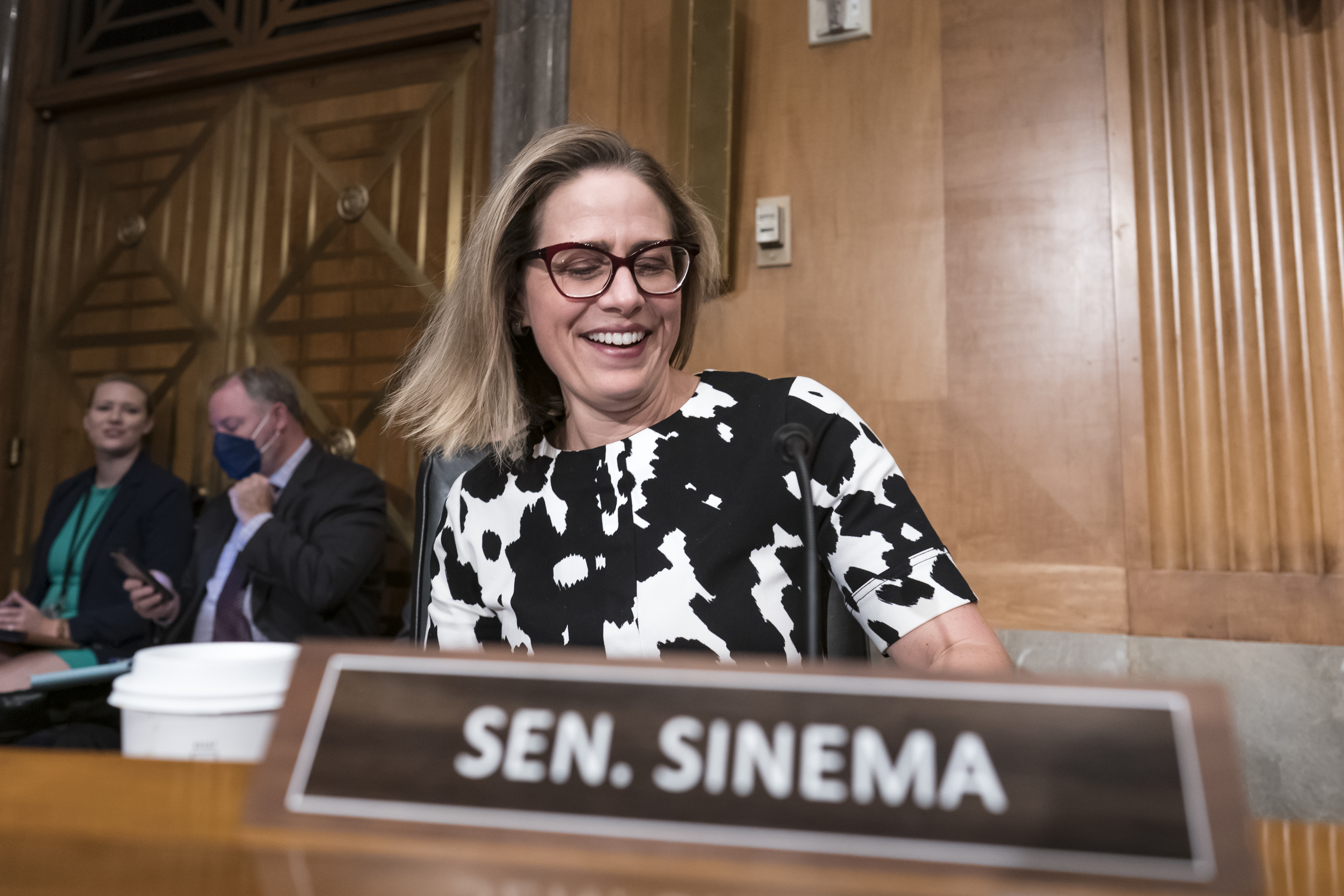 FILE - Sen. Kyrsten Sinema, D-Ariz., arrives for a meeting of the Senate Homeland Security Committee at the Capitol in Washington, Wednesday, Aug. 3, 2022. Sen. Joe Manchin sealed the deal reviving President Joe Biden’s big economic, health care and climate bill. But it was Sinema who intently, quietly and deliberately shaped the final product. (AP Photo/J. Scott Applewhite, File)
FILE - Sen. Kyrsten Sinema, D-Ariz., arrives for a meeting of the Senate Homeland Security Committee at the Capitol in Washington, Wednesday, Aug. 3, 2022. Sen. Joe Manchin sealed the deal reviving President Joe Biden’s big economic, health care and climate bill. But it was Sinema who intently, quietly and deliberately shaped the final product. (AP Photo/J. Scott Applewhite, File)